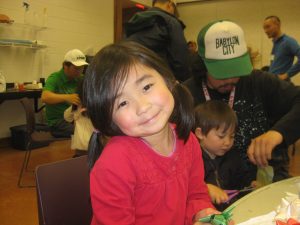By Iris Araki
English wasn’t my first language; Japanese was. I grew up speaking only Japanese to my parents, up until I started elementary school, where I was placed into the ESL (English as a Second Language) program for two years. At the same time, my parents put me and my siblings in a local Japanese weekend school. Although I tried to balance English and Japanese education, I slowly but surely lost my fluency in Japanese.
I performed decently in English school, but never in Japanese school. I felt so tired already by the end of the week with English school, but then I had Japanese school at 9 am on Saturday. I only saw the negatives of Japanese school: that I couldn’t have sleepovers on Fridays, I had more homework, I lost one day of my weekend my friends got to have. I started to resent attending, which took away from my performance during lessons.
I could hear myself slowly losing my grip on Japanese. I saw my peers learning more and more characters and easily reading through stories and passages, while I couldn’t even read one paragraph without stumbling on a kanji character I didn’t know. While other students got high marks, I received lower grades. But while seeing those grades hurt, they weren’t my priority. I thought that what I learned in English school is what would help with my future, college, and careers. Japanese school didn’t matter to me, at least not academically. But the friends that I made there mattered, which is why I kept attending.
In my hometown, there’s an Asian/Japanese community present, but it’s certainly not very strong. So when I went to Japanese school with kids who also lived in predominantly white areas and were sometimes one of the only Asian kids in their English school classes, we instantly bonded. I couldn’t find this kind of connection with other people in my hometown, and this incentivized me to keep going to Japanese school. I met some of my closest friends and have so many irreplaceable memories from there. These memories are a core part of me to this day, even though the lessons might not have been my priority.

There came a point during my sophomore year of high school where my mother told me to start putting English as my first language instead of Japanese. She meant well when she said it. By putting down English as my first language, people would speak to me in the language I communicated best in. But what she said hurt me more than I expected. In my heart, Japanese has always been my first language. But my mother’s suggestion made me realize that my ability to speak Japanese had fallen to a point where even my parents didn’t know if I could consider it my first language. How did my first language turn into a language that I barely knew?
I felt horrible, knowing how much my parents were working to keep me in Japanese school, all for it to go to waste. My parents made it clear that Japanese was and would be the primary language spoken in their house. So for me, one of their children, to speak such poor Japanese was heartbreaking.
I’ve always thought that someday, if I decide to have any kids, I would teach them Japanese. I would speak to them in Japanese, put them in Japanese classes or school for them to learn, and take them to Japan. But looking at my future now, I don’t know if I’ll be able to speak enough Japanese to do all of that. Every time I think about it, my gut turns. My identity is so important to me, and the chance that it could be taken away from me, makes me wish I had listened to my parents and focused on school.
I’ve now graduated from Japanese school after 13 years of attending. I wore the traditional 袴 (hakama) for my graduation alongside my peers, and celebrated. I felt so glad to graduate, but it was also bittersweet. I grew up with these people surrounding me, and it was so sad to say goodbye to all of them. I still think about them very often and the memories we shared. Some people still text in our group chat once in a while, but I miss when it was regularly active. I took my Japanese school graduation that happened in March as a way to prepare myself for when I graduated from high school in June. But to be honest, I was more sad about leaving Japanese school than leaving English school. I felt a wave of relief graduating from English school, not grief or sadness. And I think that’s kind of funny, since I’m closer to the friends I made in English school. I guess the sadness didn’t hit me because I knew I’d see the people I graduated high school with every time I went home. We’d have reunions five, 10, even 20 years down the line, but my Japanese school wouldn’t. After we graduated from Japanese school, that was it. It was over.
I recently visited Japan over the summer, before I moved into college. It was so relieving to see that both of my grandparents on both sides of the family were doing well. But I felt scared to talk to them. I was worried about how they’d perceive me, as their foreign-raised granddaughter who was getting away with speaking Japanese by a millimeter. I remember having dinner with my paternal grandparents in a little barbecue restaurant near their apartment, and my mother had to nudge me to talk to my grandfather. It wasn’t that he was scary―he’s a 90-something year old former military man that’s going practically deaf but can still zip through a crowded train station. But my thoughts got to the best of me, and I couldn’t muster up the courage to talk.
I do, however, love talking about my visits to Japan and seeing my extended family. I can easily recall the layout of my maternal grandparents’ house, what it smells like, the types of fruits and vegetables they grow in their backyard, and the piano room that sits just a few steps away from the living room. As someone who enjoys learning about history, Japan is a minefield of it. Even in areas you wouldn’t expect for anything to be there, like where my mom is from, a quick drive into the main city will lay pieces of history that travel all the way back to pre-American days. Sure, the country’s society and ideals are rather confusing and contradictory, but look at their train system. Or how clean the sidewalks are. Or how polite they are. How they trust each other. How kids can ride the train to school without fears of being kidnapped. And the cuisine. There are so many parts of Japan that feel surreal every time I visit.
A trip to Japan isn’t easy, nor is it affordable. After living in America for over 30 years, my parents decided that we didn’t need to go to Japan every year, only the years that really mattered, like when one of my three siblings graduated. This typically fell so we would visit Japan every three years or so. But the pandemic put our trips to Japan to a stop, and we didn’t visit for about five years. During that time, I graduated from middle school and high school. In my grandparents’ eyes, I went from a weird preteen to a steady young adult. I also went from their fluent-speaking Japanese-American granddaughter to their American granddaughter that speaks broken Japanese.
As I fill out surveys here and there in college, the question sometimes comes up: “What is your first language?” “Are you fluent in any other languages? If so, which ones?” And every time it comes up, I answer the same way I’ve always done it: “Japanese.” Even if I’m not as fluent as I once was, I’ll still write down Japanese as my first language; I won’t ever “let go” of Japanese. I rarely meet especially Japanese-speaking people at Syracuse, so it’s hard to practice here. Gradually, I’m starting to develop an English accent when I speak Japanese. But besides all of that, I still consider myself bilingual. Bilinguality, to me, isn’t just about speaking the language. It’s about immersing myself into its culture, learning about its history, talking to people that share the language with me, cooking traditional dishes, and celebrating holidays. Being bilingual is a part of my identity that will stick with me forever. I hope to study abroad in Japan for a semester to not only attend school there but also see how much my Japanese improves.
I want to be able to speak Japanese to my grandparents without worrying about what to say on the train ride to their apartment. I want to be able to talk to people without worrying about whether what I’m saying is right. I want to be confident again in the language that I grew up speaking. I’m not sure when, but I’m optimistic that it will come to that point…someday.
Iris Araki (she/her) ‘27 is from Connecticut pursuing a degree in magazine, news, and digital journalism with a minor in private music study. She runs her independent blog, titled Penny for a Thought, where she publishes similar pieces relating to self-reflection and music.

